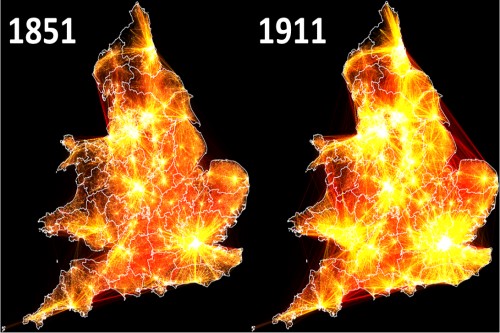University Of Bristol Study Finds Strong Cultural Regions Slowed Britain’s Urbanisation
Regional cultural boundaries in England and Wales put a brake on the rapid urbanisation which took hold across Britain in the 19th and early 20th century, research has revealed.
The study, led by the University of Bristol and published today in PLOS ONE, analysed the migration paths of the entire population between 1851 and 1911 and found that not only have England and Wales’s cultural regions proven incredibly stable over time, but the presence of these ‘boundaries’ limited the number of migrants crossing them.
Lead author Dr Joe Day, Lecturer in Historical Geography and Economic History, said: “The degree of similarity between the geography of human interactions today and in the past is astonishing. The migration patterns show a remarkable stability over time, and illustrates regions of England and Wales most people would recognise.
“For example, Yorkshire is identified as an independent ‘cultural sphere’, while Devon and Cornwall similarly represent a distinct ‘South West’ character.”
By building on previously established data sets, Dr Day and his team were able to analyse the distance migrated between a person’s place of birth and their place of residence on census night.
This data was used to develop several insightful migration network maps, demonstrating the patterns of migration remained highly consistent over the 60-year-period in the study.
“This research reveals the boundaries between cultural regions acted like barriers, and there were far fewer migrants crossing these boundaries than we would expect if they were not there,” Dr Day added.
“This has the consequence that at a time in which the pace of urbanisation in Britain has never been as fast, before or since, it was nonetheless slowed by individuals’ sense of identity and reluctance to migrate across cultural boundaries.”

